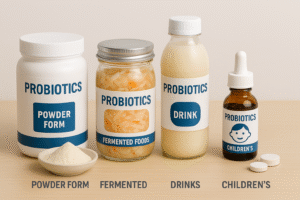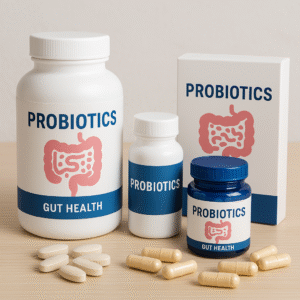The gut microbiome isn’t just some fancy science term—it’s the bustling community of trillions of bacteria, viruses, and organisms chilling out in your digestive system. And it’s a big deal because this little universe inside you plays a super important role in keeping you healthy overall. We’re talking everything from helping with digestion to swinging your mood and even affecting your immune system.
Probiotics are like these good bacteria that help keep the peace in your gut. They don’t just throw more good bacteria into the mix but also help balance things out when life (or a diet of too much fast food) sways you off course. It’s like ensuring your gut is running smoothly, which means less bloating or indigestion weighing you down.
If you’re feeling consistently bloated, dealing with random digestive issues, or just feeling off, your gut might be trying to tell you something. Common signs of an unhappy gut include tummy troubles, fatigue, and even unexpected skin problems. This isn’t something to brush off, and listening to your body is key.
When diving into probiotics, you’ll run into different types, like lactobacillus and bifidobacterium. Each has its own superpower. Some might help with digestion, while others boost your mood or energy. Figuring out what strains fit your needs best can really up your health game.
There’s more to probiotics than just gut health, too. There’s some cool science stuff out there linking your gut health to mental health. Ever get butterflies in your stomach when you’re nervous? That’s your gut and brain chatting. Research suggests keeping your gut in check can positively impact how you feel emotionally, helping ease issues like anxiety and even enhancing focus.

Choosing the Best Probiotics for Your Gut: Key Considerations
Picking a good probiotic isn’t something to rush through. Quality is everything here because you’re trusting these little helpers to make a difference in how you feel every day. First up, when checking out the options, always zero in on the strains. Different strains cater to different issues, whether it’s digestive comfort or immune support.
Potency matters too – the CFU count, or colony-forming units are a good marker of how strong or effective a probiotic could be. More isn’t always better; match the CFUs to what your body needs or what a healthcare professional suggests. It’s about getting the dose just right for your lifestyle and health goals.
Timing plays a role in making sure you get the full benefit from probiotics. Some work best when taken on an empty stomach, while others fit seamlessly into your mealtimes. Being consistent with your dosage is a big part of seeing results over time, so choose a plan you can stick with.
Safety is non-negotiable. While probiotics are generally safe, they’re not all created equal. Keep an eye out for any side effects, especially if your body’s not used to taking them. And hey, reading labels isn’t just for calorie counters. Deciphering product labels means looking beyond flashy marketing to see what’s really inside. Check for storage info, expiration dates, and verify any claims they make.
Among the sea of products out there, it helps to know which one’s got a gold star. Some of the top contenders in 2023 have been carefully vetted not only for quality but for proven results. Look for those with strong reviews and reputable sourcing. If you’re still on the fence, a healthcare provider can be a great ally in picking out what suits you best.
 Check Probiotics Label Carefully
Check Probiotics Label Carefully
Understanding the Different Forms of Probiotics
Probiotics are live microorganisms that offer a variety of health benefits when consumed in adequate amounts. They help maintain gut health, boost immunity, and even support mental well-being. With the growing awareness of their benefits, probiotics are now available in different forms to suit various lifestyles and preferences. Here’s a breakdown of the common types:
1. Powder Form
Probiotic powders are versatile and easy to use. They are typically mixed with water, juice, or smoothies, making them a great option for individuals who prefer not to swallow pills. Some powders are flavorless, while others come with added nutrients like prebiotics to enhance gut health.
2. Fermented Foods
Naturally fermented foods contain live cultures that act as probiotics. Common fermented foods include:
- Yogurt – One of the most well-known sources, packed with beneficial bacteria.
- Kimchi – A traditional Korean dish made from fermented cabbage and spices.
- Sauerkraut – Fermented cabbage rich in probiotics and fiber.
- Miso & Tempeh – Fermented soybean products that promote gut health.
These foods not only provide probiotics but also contain essential vitamins and minerals that support overall well-being.
3. Liquid Form (Probiotic Drinks)
Probiotic drinks are a convenient way to consume beneficial bacteria. These beverages often include:
- Kefir – A fermented milk drink loaded with diverse probiotic strains.
- Kombucha – A popular fermented tea packed with probiotics and antioxidants.
- Probiotic-infused juices & shots – Some brands offer fruit juices enriched with live cultures for easy daily consumption.
These drinks are ideal for those who prefer a quick and refreshing way to support digestive health.
Probiotic capsules and tablets are one of the most common forms. They provide a precise dosage and are often combined with prebiotics to nourish beneficial bacteria in the gut. Some varieties include delayed-release capsules to ensure the probiotics survive stomach acid and reach the intestines.
5. Children’s Probiotic Drops & Tablets
Probiotics designed for children come in easy-to-administer forms such as liquid drops and chewable tablets. These help young children maintain a healthy gut microbiome, especially after antibiotic use. They also support immune health and digestion.
Choosing the Right Form
Selecting a probiotic depends on individual needs and lifestyle preferences. Those who enjoy natural foods may prefer fermented options, while others looking for convenience may opt for capsules or powders. Regardless of the form, the key is to choose high-quality probiotics with scientifically backed strains for maximum benefits.
Maintaining gut health is essential for overall wellness, and probiotics provide a simple yet effective way to achieve balance. Incorporating the right form into a daily routine can lead to better digestion, improved immunity, and enhanced well-being.


Five Forms of Probiotics
Here are some popular options and their benefits:
- Culturelle Digestive Daily Probiotic Capsules – Helps reduce occasional diarrhea, gas, and bloating. Supports digestion and immune defenses.
- Seed DS-01 Daily Synbiotic – Contains 24 clinically studied probiotic strains and prebiotics to support gut health, skin health, and heart health.
- Garden of Life Dr. Formulated Probiotics Once Daily Capsules – Provides daily support for digestive and immune system health. Contains 14 raw probiotic strains.
- Rael Vaginal Health Probiotic Supplement – Supports vaginal health by maintaining a balanced microbiome, reducing infections, and promoting overall wellness.
Each probiotic has unique benefits tailored to different health needs. If you’re considering one, it’s always best to consult a healthcare professional to find the right fit for you!
Grab my top-rated picks for Gut health Click “here” below for link
Powder Form [here] Capsule Form [here] Fermented food [here] Drink Form [here]
Children ‘s Probiotics [here]
“Here is a little transparency: Our website contains affiliate links. This means if you make a purchase, we may receive a small commission. Don’t worry, there is no extra cost to you. It’s a simple way you can support our mission to bring you quality content”
